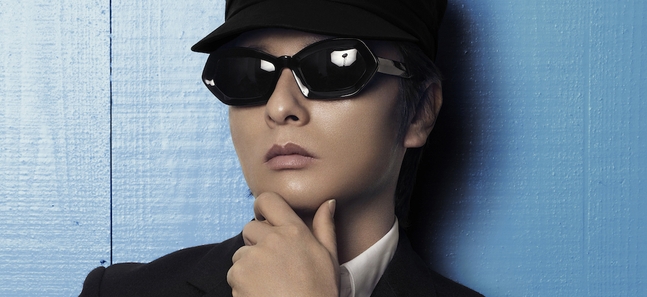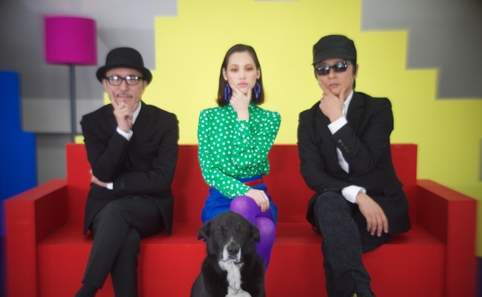
Posted: Wed May 18 2011
Towa Tei seems to have brought his whole office with him when we meet in an otherwise deserted cafe in Roppongi. He sits opposite his manager at a table piled with paper and laptops, and at one point pauses our interview to check something on the iTunes Store and make a quick phonecall. It's only a day since Tei's latest album, Sunny, hit stores on his own Hug Inc. label, and he's got an appearance booked at Dommune in the evening. 'Sorry,' he says as he returns to the conversation. 'So many things to do.'
The former New York resident doesn't have much opportunity to use English these days, emailing aside, and we speak for the most part in Japanese. While his promo photos might suggest some kind of latex-skinned automaton, in the flesh Tei is a lot more personable (and, indeed, person-like). He looks every bit his 46 years, and speaks with the frankness of someone who's come to accept his place in the world.
'I don't think I'm past it,' he says at one point. 'I don't think the music I'm making is old-fashioned. I'm just not setting out to make something that seems really "now": in three, four, five years' time, people aren't going to look at it and feel it's dated… There's a lot of music that's made for marketing purposes, or to do well in the charts, and after one or two years it just sounds embarrassing. I'm not making that kind of stuff. The music I did 20 years ago sounds a little dated now, but I don't think it's bad.'
It's been over two decades since Tei first came to the world's attention as the quietest member of Deee-Lite, the flamboyant New York dance unit responsible for 1990 mega-hit 'Groove is in the Heart.' He'd moved to the States in 1987, originally to study graphic design, and hooked up with the group – then a duo consisting of singer Lady Kier (born Kieren Kirby) and Ukrainian emigre Super DJ Dmitry – a year later.
2010 marked the 20th anniversary of Deee-Lite's breakout hit, but Tei dismisses any chances of a revival tour with a laugh and a curt 'never.' 'In around 1987, we had a kind of synchronicity,' he says. 'We were like a family. But after a while, we stopped connecting musically, we stopped connecting physically – I ended up becoming ill – and we stopped connecting mentally. I had a kid, I said goodbye and came back to Japan… We did well together with Deee-Lite, but now that bond is broken.'
Of course, he's speaking from the comfort zone of a successful solo career: Tei has seldom found himself wanting for major label support since returning to Japan, and continues to be an in-demand DJ on the Tokyo circuit, hosting regular parties at clubs including Air and Fai Aoyama. Sunny, his sixth album to date, features the kind of collaborators you can't get without good connections, including YMO's Haruomi Hosono and Yukihiro Takahashi, Cibo Matto's Miho Hatori and actress/model Kiko Mizuhara, recently seen playing Midori in Anh Hung Tran's Norwegian Wood adaptation.

Yukihiro Takahashi, Kiko Mizuhara and Towa Tei strike a pose
'I'm not going to name names,' Tei says, 'but with some artists, I'll like them personally but find their management really annoying. I thought, "I don't want to deal with people like that any more," so I decided to go for easy musicians with easy management.'
In Mizuhara's case, this took the form of a duet with Takahashi on jaunty lead single 'The Burning Plain', although as with many of Tei's productions, her contribution came after the track was more or less finished. 'We were mutual fans, but we hadn't met before,' he explains. 'I felt that Takahashi had raised the bar with his vocals – his English pronunciation is really good – and I was struggling to think who would be good to do the duet.
'Then I saw a TV documentary on Kiko-chan, which said that her dad was from Texas and she spoke English very well. Her pronunciation was fine, she looked fine… so I asked her, and she said she'd never sung before but she was really interested.' Judging from the amount of airplay the song has been getting recently, it was a savvy choice.
Sunny was originally scheduled for an April 20 release, and Tei had completed the album before the March 11 quake and tsunami; he describes how he'd stayed up late the night before, waiting to receive the final masters from a studio in New York. The way he tells it, the record stands as an artifact from an earlier, happier time, and he admits that he'd probably still be reworking it if he hadn't completed it before the tragedy occurred.
'It was kind of like a concept album,' he says. 'I was packaging up and concentrating all the sunny, happy, normal days before March 11, like making an espresso. We can't go back to that time, but… I'd be happy if people listened to it and it cheered them up.'
Japan's professional party crowd have had to do some serious soul-searching in the wake of March 11, or 'three-one-one,' as Tei likes to call it. Never mind that scores of club events were cancelled in the immediate aftermath: questions were also raised – often, it must be said, by overseas acts due to play here – about whether it was appropriate to be having fun. Tei says that his own thinking has also changed, although he reiterates throughout our conversation, in English, that 'music is not guilty'.
'Lots of people I know said they stopped listening to certain music after 3/11,' he says. 'Those tunes they play in clubs with electronic siren sounds… the reality has become a lot scarier, what with the quake alerts on TV and those applications on people's phones. When I started DJing again a month after the quake, I just naturally stopped playing stuff like that. I didn't feel guilty about partying, but my mood had changed.'
And so too, it turns out, have his listening habits. 'Since 3/11 – and this is just personally speaking – I've only been wanting to listen to music that's very good, very soulful,' he says. 'For the last week, I've been listening to nothing but James Brown and Led Zeppelin.' Who'd have thought it?
Sunny is out now on Hug Inc. Towa Tei appears as a guest DJ at Mixpedia, May 21, at Unit, Daikanyama.
Tweets
- About Us |
- Work for Time Out |
- Send us info |
- Advertising |
- Mobile edition |
- Terms & Conditions |
- Privacy policy |
- Contact Us
Copyright © 2014 Time Out Tokyo














Add your comment